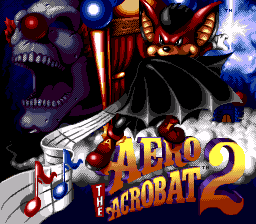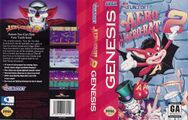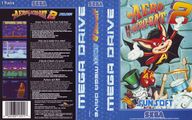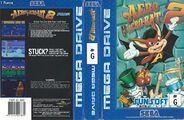Difference between revisions of "Aero the Acro-Bat 2"
From Sega Retro
m |
|||
| Line 10: | Line 10: | ||
| genre=Action | | genre=Action | ||
| releases={{releasesMD | | releases={{releasesMD | ||
| − | | md_date_eu=1995 | + | | md_date_eu=1995-08{{fileref|MeanMachinesSega35UK.pdf|page=82}} |
| md_code_eu=T-15166-50 | | md_code_eu=T-15166-50 | ||
| + | | md_rrp_uk-29.99{{fileref|MeanMachinesSega35UK.pdf|page=82}} | ||
| md_date_us=1995-01{{fileref|EGM US 065.pdf|page=298}} | | md_date_us=1995-01{{fileref|EGM US 065.pdf|page=298}} | ||
| md_code_us=T-15166 | | md_code_us=T-15166 | ||
| Line 21: | Line 22: | ||
| esra=3 | | esra=3 | ||
}} | }} | ||
| − | {{stub}}''''' | + | {{stub}}'''''{{PAGENAME}}''''' is the sequel to ''[[Aero the Acro-Bat]]'', and was released for the [[Sega Mega Drive]] and Super Nintendo in 1994. Like its prequel, the game follows the adventures of Aero, a bat tasked with saving the world from Edgar Ektor. |
There are several improvements over the original game, such as more moves, cutscenes that progress the game's story in between each world, and a password system that allows progress in the game to be saved. | There are several improvements over the original game, such as more moves, cutscenes that progress the game's story in between each world, and a password system that allows progress in the game to be saved. | ||
Revision as of 14:25, 29 March 2017
| Aero the Acro-Bat 2 | ||||||||||||||||||||
|---|---|---|---|---|---|---|---|---|---|---|---|---|---|---|---|---|---|---|---|---|
| System(s): Sega Mega Drive | ||||||||||||||||||||
| Publisher: Sunsoft | ||||||||||||||||||||
| Developer: Iguana Entertainment | ||||||||||||||||||||
| Sound driver: GEMS | ||||||||||||||||||||
| Genre: Action | ||||||||||||||||||||
| Number of players: 1 | ||||||||||||||||||||
| ||||||||||||||||||||
This short article is in need of work. You can help Sega Retro by adding to it.
Aero the Acro-Bat 2 is the sequel to Aero the Acro-Bat, and was released for the Sega Mega Drive and Super Nintendo in 1994. Like its prequel, the game follows the adventures of Aero, a bat tasked with saving the world from Edgar Ektor.
There are several improvements over the original game, such as more moves, cutscenes that progress the game's story in between each world, and a password system that allows progress in the game to be saved.
Contents
Story
The story starts directly after the events of the original game, where Aero had knocked Edgar Ektor off of a tower. After knocking him off, Aero leaves to explore Ektor's museum, finding a mirror which brings him to an ancient castle. Meanwhile, Ektor's henchman Zero manages to save him before he hits the ground, and tells Zero to prepare a 'Plan B'.
Gameplay
The game is split into 8 worlds, all of them except for the final world with three 'acts' each. The goal of each level is to find the exit at the end of every act, defeating enemies and collecting power-ups along the way.
Aero keeps his drill jump from the original game, an ability that can be aimed either diagonally up or down to reach enemies and platforms. New to this game is the added ability to aim the drill jump straight down, allowing Aero to attack enemies directly below him. Food can be collected for extra points, and stars can be thrown at enemies to defeat them, much like the original game. There are also four hidden letters in each act that spell the word 'Aero'. Finding all four letters will unlock a cup switching game at the end of the act where an extra life can be earned.
The game is split into eight worlds, each with three 'acts' each. There are three boss fights in the game, two of them at the end of certain worlds, and the third and final fight at the end of the final level.
Controls
 +
+ : Drill jump diagonally up
: Drill jump diagonally up +
+ : Drill jump diagonally down
: Drill jump diagonally down while in the air: Drill jump directly downwards
while in the air: Drill jump directly downwards
Production credits
- Created by: David Siller
- Produced by: David Siller
- Directed by: Nigel Cook, Carl Wade
- Design by: Nigel Cook
- Team Leader: Carl Wade
- Programmers: Carl Wade, Richard Cowie
- Additional Programming: Iguana UK
- Project Manager: Jay Moon
- Creative Director: Nigel Cook
- Art Director: Matt Stubbington
- Technical Director: Craig Galley
- Executive Producer: Jeff Spangenberg
- Lead Artists: Jonathan Casco, Michael McCallion
- Artists: Adrian Ludley, Gregg Hargrove, Patrick Thomas, Adam McCarthy
- Additional Art: William B. Yeatts, Matt Stubbington
- Music Coordinators: Jay Moon, Darrin Stubbington
- Music and Sound Effects: Fox Productions
- Sunsoft Art Director: Mario Zavala
- Technical Manager: Al Artus
- Consumer Product Manager: Steve Gehrke
- Marketing Director: Karen Shadley
- Chairman: Masami Maeda
- Vice Chairman: Tad Shimamoto
- Director Sunsoft Japan: Kiharu Yoshida
- International Coordinator: Kenji Yoshioka
- Game Test Manager: Sam Patel
- Game Testing: Mike Spangenberg, Steve Rizor, Daniel Rizor, Ryan Siller, Matthew Ross, Dan MacArthur, Steve Gehrke, René Boutin, Justin Siller
- Game Manual: Alison Quirion
- Executive Assistant: Nanette Hyssong
- Customer Service and Credit: Kazuko Harman, June Eckert, Julie Williams, Jamie Jorgenson, Erin Berry, Connie Perez, Jaupale Laster
- Sunsoft Thanks To: Bruce Reilly, Cathy Juby, Toko Okano, Darin Horgan, John Davis, Karen Lillie, Sherry Ross, Akito Takeuchi, Kazuaki Gotou, Masato Kawai
- Very Special Thanks: Debra Siller
- In Memory Of: Ayrton Senna
- Iguana Thanks To: Stephen Broumley, Pete Suarez, Beth Spangenberg, Tammy Mullins, Jane Notgrass, John Lowe
Promotional material
also published in:
- EGM² (US) #5: "November 1994" (1994-1x-xx)[3]
- Electronic Gaming Monthly (US) #65: "December 1994" (1994-xx-xx)[4]
Physical scans
| Sega Retro Average | |||||||||||||||||||||||||||||||||||||||||||||||||||||||||||||||||||||||||||||||||||||||||||||||||||
|---|---|---|---|---|---|---|---|---|---|---|---|---|---|---|---|---|---|---|---|---|---|---|---|---|---|---|---|---|---|---|---|---|---|---|---|---|---|---|---|---|---|---|---|---|---|---|---|---|---|---|---|---|---|---|---|---|---|---|---|---|---|---|---|---|---|---|---|---|---|---|---|---|---|---|---|---|---|---|---|---|---|---|---|---|---|---|---|---|---|---|---|---|---|---|---|---|---|---|---|
|
| 74 | |
|---|---|
| Based on 19 reviews | |
Technical information
ROM dump status
| System | Hash | Size | Build Date | Source | Comments | |||||||||
|---|---|---|---|---|---|---|---|---|---|---|---|---|---|---|
| ✔ |
|
2MB | 1994-07 | Cartridge (US) | ||||||||||
| ✔ |
|
2MB | 1994-07 | Cartridge (EU) |
References
- ↑ 1.0 1.1 1.2 File:MeanMachinesSega35UK.pdf, page 82 Cite error: Invalid
<ref>tag; name ":File:MeanMachinesSega35UK.pdf_p82" defined multiple times with different content - ↑ File:EGM US 065.pdf, page 298
- ↑ EGM², "November 1994" (US; 1994-1x-xx), page 119
- ↑ Electronic Gaming Monthly, "December 1994" (US; 1994-xx-xx), page 153
- ↑ 1700 igr dlya Sega, "" (RU; 2001-xx-xx), page 13
- ↑ Cool Gamer, "9" (RU; 2002-10-13), page 7
- ↑ Electronic Games (1992-1995), "January 1995" (US; 199x-xx-xx), page 100
- ↑ Electronic Gaming Monthly, "January 1995" (US; 199x-xx-xx), page 40
- ↑ Entsiklopediya luchshikh igr Sega. Vypusk 1, "" (RU; 1999-xx-xx), page 286
- ↑ Entsiklopediya luchshikh igr Sega. Vypusk 5, "" (RU; 200x-xx-xx), page 35
- ↑ GameFan, "Volume 2, Issue 11: November 1994" (US; 1994-xx-xx), page 32
- ↑ Game Players, "Vol. 8 No. 3 March 1995" (US; 1995-0x-xx), page 58
- ↑ GamePro, "January 1995" (US; 199x-xx-xx), page 44
- ↑ MAN!AC, "01/95" (DE; 1994-12-07), page 78
- ↑ Mega Fun, "12/94" (DE; 1994-11-23), page 117
- ↑ Next Generation, "March 1995" (US; 1995-02-21), page 100
- ↑ Play Time, "1/95" (DE; 1994-12-07), page 100
- ↑ Sega Magazin, "Dezember 1994" (DE; 1994-11-17), page 76
- ↑ Sega Magazine, "September 1995" (UK; 1995-08-13), page 90
- ↑ Sega Pro, "October 1995" (UK; 1995-09-07), page 62
- ↑ Sega Megazone, "February 1995" (AU; 1995-0x-xx), page 37
- ↑ Tricks 16 bit, "Tricks Sega Gold 800 igr" (RU; 1998-03-20), page 8
- Pages with reference errors
- 1 player games
- US Mega Drive games
- All US games
- EU Mega Drive games
- All EU games
- AU Mega Drive games
- All AU games
- Mega Drive games
- 1995 Mega Drive games
- All 1995 games
- Mega Drive action games
- All action games
- Old content rating field
- Use romtable template
- All games
- Stubs
- Credits without reference
- Creditstable with no console field
- GalleryPrintAd file defined
- Old-style rating (egm)
- Rating without source
- Old-style rating (gamefan)
- Old-style rating (gameplayers)
- Old-style rating (maniac)
- Old-style rating (mms)
- Use magref
- Old-style rating (nextgeneration)
- Rating without PDF source
- Old-style rating (segamaguk)
- Old-style rating (segapro)
- Update ratings template
- 8 old ratings
- Old technical information





